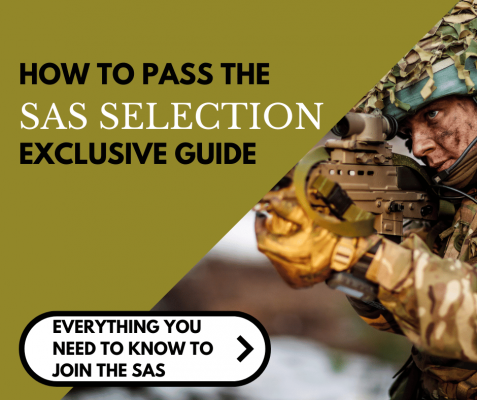 Special Air Services is a speciality unit in the Army. It is part of the reserves. Units typically deal with difficult and changing circumstances. Command or guidance may not be available during operational and strategic situations. Those in this special unit often have to work alone or in a small team. Given the special nature of some of the tasks it can be difficult to find individuals qualified for the SAS department. There is a process followed by the Army to help locate individuals that are potential candidates for the special unit. Here, we’re going to be taking a look at SAS eligibility criteria and British SAS Recruitment.
Special Air Services is a speciality unit in the Army. It is part of the reserves. Units typically deal with difficult and changing circumstances. Command or guidance may not be available during operational and strategic situations. Those in this special unit often have to work alone or in a small team. Given the special nature of some of the tasks it can be difficult to find individuals qualified for the SAS department. There is a process followed by the Army to help locate individuals that are potential candidates for the special unit. Here, we’re going to be taking a look at SAS eligibility criteria and British SAS Recruitment.
Entry Requirements – SAS Eligibility Criteria
The SAS section is for reservists; however, to find qualified individuals to become a part of the team the Army looks from within the enlisted, officer, and reserve units. Like the Special Boat Services of the Navy, a candidate either needs to be in the last 6 months of enlistment or already in the reserves to become a part of this special unit to enter at an age of 34 years. Any male that is 18 to 32 without prior military service can become a part of the special unit. The age limit is up to 42 years for staying in the unit, but training and acceptance has to occur at 32 years or 34 years depending on military service.
Besides age there are other requirements to fulfil. Volunteers into this unit need to be able to travel overseas for deployment, pass a fitness and commitment test. The SAS unit is physically difficult, as well as mentally demanding. The selection course occurs twice each year and assesses aptitude and continuation.
Aptitude for SAS – SAS Eligibility Criteria
During the aptitude phase the fitness test will occur. All candidates need to be physically fit before the course begins with the determination to improve even more for the special unit. Qualities examined for include self-confidence, self-discipline, ability to work alone, physical and mental fitness, and the ability to assimilate information and learn new skills.
Continuation of Selection – SAS Eligibility Criteria
After the aptitude period is over training will begin where candidates will learn standard operating procedures to continue to evaluate the individual and train them for deployment when special circumstances arise. The commitment phase will look to make certain there is at least a year of time the person can be in the unit after training with the hope of actually continuing well beyond the first training year and one year as a reservist.
Medical Situation – SAS Eligibility Criteria
As it is possible to enter prior to any military experience candidates will need to fulfil the medical and physical criteria that the Army requires. This means the timed runs, heart, lung, and lung capacity tests, hearing and eyesight tests will be required as well as filling out the medical questionnaire.
As long as there are no pre-existing conditions or illnesses that would affect the health and safety of the candidate, the team, or others it is possible to pass the medical exam. For hearing and eyesight there are limitations to ensure that someone can hear clear instructions, and see at an appropriate distance or nearness with aids. For personnel already in reserves or active military it is necessary to take the fitness tests for entry into the SAS; however, the medical is usually a re-check to make certain nothing has changed during enlistment.
Nationality and Residency – SAS Eligibility Criteria
Anyone entering the Army for the first time will need to be a citizen of Britain, Commonwealth nations, or hold a dual nationality. The person also must live in the UK for 5 years with no longer than 6 months missed during the residency period. If these criteria are met then the candidate is qualified. For those already in the reserves or enlisted in the Army this criteria should already be met.
Convictions – SAS Eligibility Criteria
Criminal convictions unless they are significant in offence will not eliminate a candidate from Army service. While convictions cannot be used to end all Army candidacy there are special units like the SAS that have stricter rules for the types of convictions allowed or disallowed given the nature of the work. For those enlisted or in the reserves this should not be an issue unless something occurred while already apart of the military.
Tattoos and Piercings – SAS Eligibility Criteria
Piercings are not allowed, unless the area will heal overtime. Tattoos cannot be excessive, offensive, or obscene and must be hidden under dress uniforms.
Conclusion – SAS Eligibility Criteria
Now you have a good idea about whether you are eligible for a position in the SAS. If you’d like expert advice and top tips on joining the SAS, check out How to Join the Special Air Service. If you want help with the SAS numerical ability test, check out numerical ability test questions and answers.
